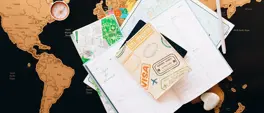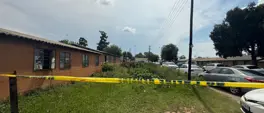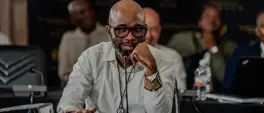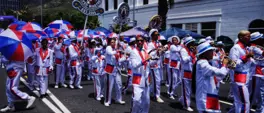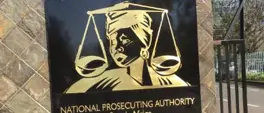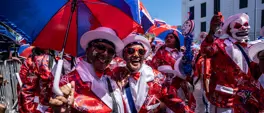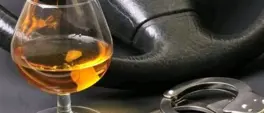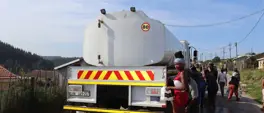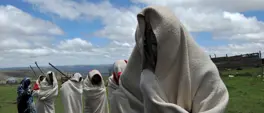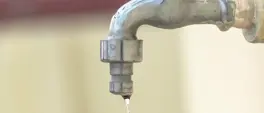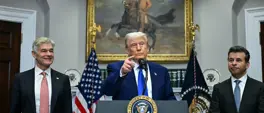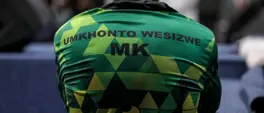GRAEME RAUBENHEIMER: 'I yearn to take a fancy new blue and white train in my country'
Graeme Raubenheimer
21 May 2024 | 7:43As Raubenheimer travelled three hours from York to London to cast his vote, he writes that he imagined a slick UK-styled rail service (akin to the Gautrain) connecting the Cape Town city centre more directly with Bellville, Athlone, and Muizenberg.
“See it. Say it. Sort it” are the words that blare through this train’s intercom system, and I’m immediately pulled out of a daze.
This is the United Kingdom’s earworm slogan for private rail services, a call to report petty thieves or antisocial behaviour.
As I travelled three hours from York to London, my daydream took me back to my young student days in Bellville, where I used to take Metrorail’s yellow trains and was roughed up by criminals once or twice. Mostly, it was an undeniably affordable service I miss.
I imagined a slick UK-styled rail service (akin to the Gautrain) connecting the Cape Town city centre more directly with Bellville, Athlone, and Muizenberg. I was immediately sobered by the deadpan South African reality: the station near my SA home was boarded up before I left for the UK last year.
Once inside the hot and noisy “Tube” in London, I again entered a little trance on my way to vote: imagine a subway service from the Cape Town station deck to Sea Point! My naive self was on a Ramaphosa-infused bullet train fever dream.
The truth is twofold. It is meant to be the backbone of the Mother City’s transport network for the working class, but Metrorail has struggled to pull its service out of the doldrums of a lockdown copper thief free-for-all, although those much-touted fancy blue and white trains are running more frequently.
The Democratic Alliance (DA) pushes for rail devolution in the Western Cape.
Meanwhile, the UK’s persistent rail strikes point to a push for the government’s nationalisation of this private sector. What a stark SA-UK comparison.
Was this a topic other South Africans considered when they reached central London’s Trafalgar Square to cast their special vote this weekend?
The history book shows two things that happened in 1933. The pre-apartheid Union of SA held elections, and the National Party won half the number of the whites-only vote - an early warning of a rising regime.
And in 1933, the High Commission of South Africa - SA House - was built. It was designed by Sir Herbert Baker, who also drew up the colonial character of Pretoria’s Union Buildings.
The British architect’s touch was installing a golden Springbok towering above the high commission’s entrance, gazing over the snaking queue of voters, who, by 9 am on Saturday, had almost taken up the entire London block.
From Springbok rugby jerseys to Bafana Bafana shirts to red EFF berets and green ANC bucket hats, South Africans from all over the UK came to cast their (very) special ballots. Rise Mzansi volunteers handed out Chappies chewing gum.
Did you know that determined DA diehards dolled out big blue DA stickers? The Patriotic Alliance blared Johnny Clegg’s ‘Impi’ for all to mouth the words to. It was all fairly festive, and the weather wasn't “kak” either.
The Independent Electoral Commission (IEC) expected more than 24,000 of us.
We weren’t prepared for the long wait, but with vendors walking around selling biltong and friendly Saffa faces all about you, no one complained or held back their views. “So proud to be able to cast my vote today to make a difference for the country where I was born,” said one DA voter.
Another told me: “The African National Congress (ANC) means a lot to me today because they’ve improved the lives of black people in particular”. An impassioned Limpopo local: “We shouldn’t be having water shedding … load shedding”.
A mother of an 11-year-old daughter: “I can’t see my daughter going back to SA”.
Independent electoral observer Hayley Reichart, all dressed up in Mzansi’s colours, brushed past me with a birthday cake in tow.
Someone in the queue is celebrating, she tells us! Soon, we hear cheers. Later, Reichart leads the crowd in a rendition of Nkosi Sikelel' iAfrika. Some passionate people here remind us that the expat vote counts, perhaps in their minds even more than the domestic one(s).
After all, those abroad were only handed one ballot paper with the names of 70 registered political parties carrying their candidates’ faces. Jacob Zuma’s grinning portrait is quickly identified, although the latest Constitutional Court ruling finds him unable to win a seat in Parliament. After IEC officials check your ID, you descend a twirling staircase with walls carrying famous SA quotes from Desmond Tutu and others.
Your thumb receives that sought-after indelible black mark (I still have mine). You’re handed a ballot and two envelopes marked A and B. You find a booth. And then you either go with the decision you thought always mattered. Perhaps the angry protest vote? Or maybe that last-minute “educated” vote after a heated conversation at the pub? Whatever it is, you’re either there slightly longer than expected, or you’ve come up with a purpose that only a three-hour queue can give you.
The ballot goes into unmarked envelope A and then into envelope B with your particulars. This is intended to protect a special vote’s secrecy once counted later. You’re shown out, back into the London buzz, and content you’ve done it. You've contributed to a hard-earned democracy.
Of course, 30 years ago, this feeling of contentment paled to the immense emotions that followed 1994’s liberation. For 92 years, the African majority was denied the political right to vote in black and white, a decision cast without them in white man’s ink on a cold, long table divided by wounded Boers and triumphant British generals in Vereeniging in 1902. As a thirty-something South African today, passionate about my country's history, politics, and development, I face this duality: never truly witnessing the heights of 1994’s zenith but feeling content in playing my part now, wherever I may be in the world.
Today’s world increasingly recognises South Africa’s moral stand for accountability over Palestine's unfolding destruction, the footage of which is a social media swipe away. Witnessing our flag’s colours entwined with Palestine's as streams of demonstrators marched toward the UK’s Houses of Parliament, just a stone's throw away from the ongoing vote - content feelings turned to an undeniable sense of pride.
My contentedness is layered with one part naivety: perhaps years of grand-scale state capture corruption and paralysing power cuts are finally behind us, freeing SA from inert GDP growth! But then it’s buoyed by a thick layer of dogged journalistic cynicism: how long can our social grant system keep nearly half a country alive off a shrinking tax base?
A tax base about to be stretched by the bold attempt at universal healthcare? As noble as both of these social welfare implements are in a world without them, I naturally worry that the centre will buckle. With unemployment shy of a whopping 33%, job creation has to be among the chief mandates for whoever holds the mantle.
But SA voter apathy is not new. Of the 24,000 registered, only 13 283 voted in London over three days. Sunday's queue was shorter. This reflects a voter turnout of 54%. These are not the numbers the IEC is looking for. Context is key: each party needs 40,000 votes to get a seat in Parliament. So now, it is over to the nearly 28 million registered South Africans back home to show up on the 29th of May.
Indeed, by September, when I'm due to jet back to the Mother City after a year abroad as a UK Chevening Scholar, Mzansi may be shifting into a radically different political beast or perhaps awaiting the “New Dawn” yet to reach its high noon.
And still, I will yearn to take a fancy new blue and white train in my country, whether my local train station is open or not.
Graeme Raubenheimer is a 23/24 UK Chevening Scholar currently studying Contemporary History and International Politics at York University in the UK. He is also an award-winning broadcast journalist with 14 years in hard news. Find him on X here.
Get the whole picture 💡
Take a look at the topic timeline for all related articles.
